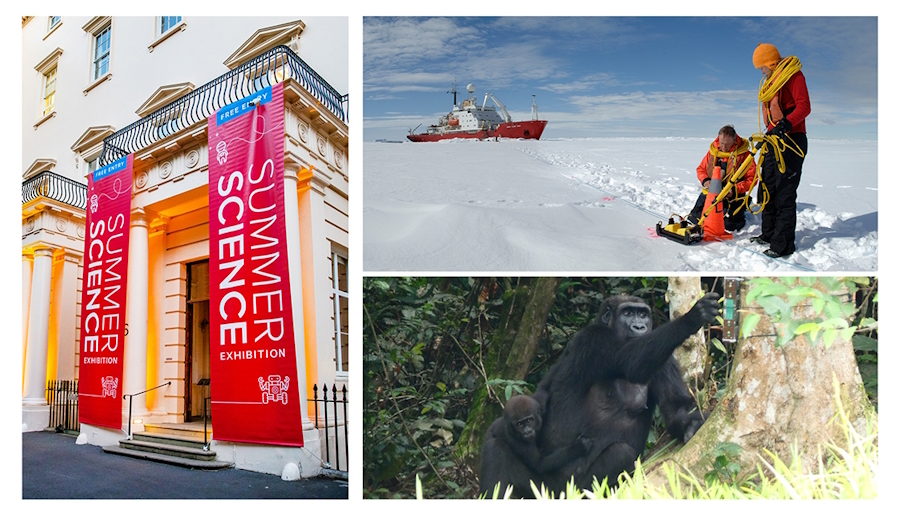Discover how UV light can remove tumours, learn about innovative tech exploring dark matter and hear bubbles escape from ancient ice at the Royal Society Summer Science Exhibition
29 April 2024
Join the Royal Society for a festival of discovery at this year’s Summer Science Exhibition (2-7 July 2024), the free annual extravaganza showcasing the UK’s most exciting research, lectures, and late-night events – no two days are the same.
The Society’s flagship event will feature mind-blowing science, thought-provoking talks and jaw-dropping demonstrations, with more than 250 leading scientists on hand to answer questions and talk about their innovative work.
Cosmologist Carlos Frenk, Fellow of the Royal Society and Chair of the Public Engagement Committee, said:
“Visitors to this year’s Summer Science Exhibition are in for a real treat. This year’s event promises to be one of our best yet. From innovative research looking at the evolutionary past of our human brains and what we can learn from our great ape cousins, to cutting-edge technology attempting to define what dark matter actually is, and in doing so, solve one of the universe’s greatest mysteries. There truly is something for everyone.
“Science is vital in helping us understand the world we live in – its past, present and future. I urge visitors of all ages to come along with an open mind, curiosity and enthusiasm and celebrate amazing scientific achievements that are benefiting us all.”
Bodies and brains
Meet immunologists exploring ways to personalise vaccines using a simple blood test to see if and when additional vaccine shots, called boosters, might effectively prolong protection. The way we respond to vaccines can vary just as memories are unique to each person, as too can an individual’s need for additional vaccine shots against specific infections. Step back in time to discover the history of vaccinations through 300-year-old documents from the Royal Society archive and peer through glass microbiology artworks by Luke Jerram.
The way we solve problems with our hands has a motion structure that is similar to how we put words together to create meaningful speech. Take the Great Ape Challenge to discover how our modern human language evolved from object manipulation skills that we share with our great ape cousins. Keeping on the theme of movement, put your dancing skills to the test at Baby Boogie - an interactive exhibit that demonstrates how newborn wriggling prepares the brain and body to navigate a complex physical and social world.
From UV light that can remove tumours with expert precision to personal brain scanners, discover the transformative healthcare technologies that could be just around the corner. Also, have your say on the legal, ethical and technical challenges of stem cell-based embryo models. The models are currently being used to study the early stages of human development but how should they be regulated?
Tech for the planet
Batteries will be essential to daily life as fossil fuels are phased out, but increased demand for the minerals that make conventional lithium-ion batteries could have significant environmental and geopolitical consequences. Meet the scientists on a mission to make the batteries that power our lives more sustainable – made from sodium or copper, upcycled plastic or electronic waste – and have a go at making and testing your own battery.
Scientists have warned that planet Earth could be on the cusp of a climate change 'tipping point' which could have catastrophic consequences for many of the world's mega cities and more than a billion people. Talk to researchers exploring the increased risk facing parts of the Antarctic ice sheet, explore a 3D model of Antarctica and hear ancient air bubbles escape from thousands-of-years-old ice as it slowly melts.
The ocean regulates our climate and drives our weather. Meet the scientists developing technologies to measure the ocean’s heat uptake, critical for climate science, that could have severe consequences for life both in the oceans and on land. Plus, learn how scientists are working with local communities in the Philippines to make mining more sustainable, by cleaning up abandoned mines and reducing their impact on people and the planet.
Understanding the universe
The James Webb Space Telescope is our most advanced window to the Universe. Its unprecedented resolution and sensitivity are now revolutionising our view of the cosmos, providing new insights into our own Solar System, probing the atmospheres of extrasolar planets, and discovering the most distant galaxies in the Universe. Two years on since its first observations of the universe, meet the UK scientists working with the telescope and explore some of its stunning first discoveries.
Our lives are flooded with light, but its wonders are more amazing than you could imagine. Researchers will present cutting-edge photonics experiments looking at how to better manipulate light and use it to understand the world at the nanoscale, from biology to quantum physics. Catch a glimpse of the powers of light as brilliant green lasers levitate tiny objects and light is twisted into bursts of colours.
Discover the secrets of the universe with scientists building dark matter detectors at ultra-cold temperatures that could bring us one step closer to solving one of the greatest mysteries of science. Speak to the researchers studying the properties of the ghost-like, mysterious neutrinos, which may help us answer fundamental questions about our universe. And experience, using VR, what it’s like to be 100,000,000 times smaller than a ping pong ball as you shrink down to atomic scale before being implanted into materials with atomic precision.
The Summer Science Exhibition will open with an adults only Lates event on Tuesday 2 July at 6pm at the Royal Society, Carlton House Terrace, London, SW1Y 5AG. The exhibition will open its doors to the wider public from 10am on Wednesday 3 July to Sunday 7 July 2024. The event is free and open to the public – no ticket required. Twitter Hashtag: #summerscience
